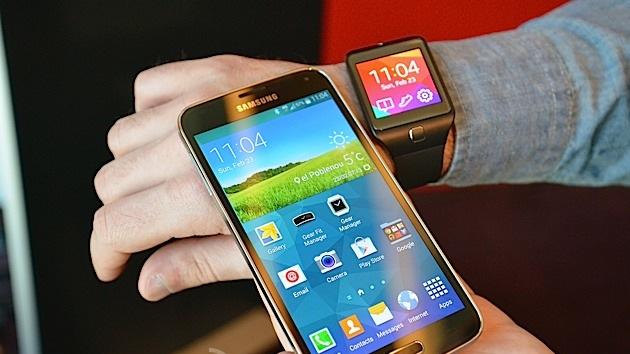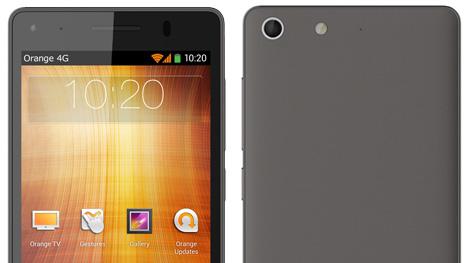mobilepostmini
Latest

Samsung's Galaxy S5 now comes in a tweaker-friendly Verizon model
Fancy a Galaxy S5 on Verizon, but still want the freedom of tweaking your smartphone to your heart's content? Today's your lucky day. Samsung has just released a Developer Edition of the Android smartphone that's built for Big Red's network. The device is largely identical to what you'd find in the local carrier store, including branding. You're just getting an unlocked bootloader that will make it easier to install unofficial firmware. This special GS5 is also expensive at $599 contract-free, but that's what you'd shell out for the regular Verizon model on similar terms -- if you're already willing to pay full price, you might as well get more control over the device you buy.

Here's how Google's modular phone will get its 3D-printed parts
Google's modular Project Ara smartphone is all about customization, but that creates a challenge: how are manufacturers supposed to build so many uncommon (and possibly unique) parts? The crew at 3D Systems is more than happy to tell you -- it just outlined the 3D printing techniques it's using to make Ara a reality. The company is dropping the conventional printing process, which bogs down due to frequent changes in speed, in favor of a continuously moving system that's fast enough to cope with mass production. The technique should generate "millions" of parts, even when some components need special treatment.

You can now use the iPhone for free, as long as you don't mind old gear
To date, FreedomPop's no-cost phone service has been attached to older Android phones. That's fine for many, but not exactly diverse. Your choices are a little better now that carrier has added iPhone support to its lineup, though. You can get 200 voice minutes, 500 messages and 500MB of data per month on Apple's handset without paying a dime; it costs the equivalent of $5 per month if you need unlimited calls and texting. It sounds great, so what's the catch?

California's smartphone kill-switch bill flops in the state senate
US carriers can all collectively breathe a sigh of relief today: California's mobile kill-switch bill is dead, at least for now. The would have required all smartphones sold in the state to include a remote-kill feature designed to render stolen phones useless. The bill was designed to curb phone robberies by making the crime less lucrative. If carriers didn't comply, the state would have been able to fine them $2,500 for every unsupported device sold. Although the fine would have only been enforceable in California, the bill could have put the remote-kill feature in phones nationwide. In fact, it still might: though the bill failed to garner enough votes to move on to the state assembly, it still has the option to return to the senate in the future.

Oppo's bringing another LTE phone to the US (and it might just be affordable)
Oppo has a reputation for clever smartphones, but there's a good reason why you rarely see its devices in the US: it hasn't had local LTE data until the (currently unreleased) Find 7, and that's not exactly cheap. Imagine our surprise when we found a version of the R1 with US-capable LTE, fresh from FCC approval. The high-style, low-cost phone can now handle 4G data on T-Mobile and, to a limited extent, AT&T. It should also run quickly on Canadian providers.

C Spire will carry the Samsung Galaxy S5 in May
C Spire customers had to wait months after the initial launch to get the Galaxy S 4, but they won't have to be nearly so patient with the Galaxy S5. The southern US carrier has revealed that it will be carrying Samsung's Android flagship in May, just weeks after the biggest networks get their turn. While there's no mention of pricing so far, it won't be surprising if the GS5 costs the same $200 on contract that we've seen at the largest providers. The relatively quick launch may not have an immediate effect outside of C Spire's core markets, to be sure. Still, it suggests that Galaxy fans nationwide won't have to leave their favorite regional carriers just to get Samsung's latest and greatest in a timely fashion.

Engadget Mobile Podcast 202 - HTC One (M8)
This week, your host Brad Molen is joined by Phil Nickinson (Android Central) and Russell Holly (Geek) to dig into the details of HTC's newest One smartphone. They've all spent some quality time with the M8 version of the One and can provide insight into the build quality, software performance and day-to-day functionality. There's lots of laughs, no-nonsense perspective and more than a few anecdotes about the One (M8), Android, HTC and life in general. So put down that peanut butter and jelly, because it's Engadget Mobile Podcast time! Hosts: Brad Molen Guest: Phil Nickinson, Russell Holly Producer: Jon Turi Music: Tycho - Coastal Brake (Ghostly International) Hear the podcast:

ZTE's giant Nubia X6 has 13MP cameras on the front and back
If you believe that China gets all the good phones, this won't change your mind. ZTE's premium Nubia brand has just launched the X6, a handset-cum-tablet with a 6.44-inch, 1080p screen. As with Oppo's Find 7, ZTE lavished it with top-notch specs, including a Snapdragon 801 chip, 3GB max RAM, up to 128GB storage and a 4,250 mAh battery. The kicker, though, is the pair of 13-megapixel cameras on the front and back -- a rare setup for a non-monkey phone. The front shooter puts many smartphones' main cameras to shame with backside illumination, video auto-focus and an f/2.2 lens. The back-facing camera ups the ante with an f/2.0 lens, optical image stabilization and dual flashes. Alas, if you were looking to wrap your (presumably large) mitts around one in the US or Europe, the Nubia X6 will likely stay put in China. It's now up for pre-order at $HK 5,010, or around $640 for the top model.

Engadget Mobile Podcast 201 - The proposed Sprint / T-Mobile merger
Spring is approaching and change is in the air, not only for the Mobile Podcast, but also for US carriers. Your host Brad is kicking off a new podcast format by interviewing industry analyst Jan Dawson of Jackdaw Research about the ins and outs of a potential Sprint and T-Mobile merger. This segment is followed by a continuing dialog on the topic with Engadget editor and self-proclaimed mobile fiend Chris Velazco. What you get is a double dose of cogent discussion about the proposed merger, delving into the potential impact on the consumer and the companies involved. Head on down to the streaming links below to catch this week's episode of the Engadget Mobile Podcast. Hosts: Brad Molen Guest: Jan Dawson, Chris Velazco Producer: Jon Turi Music: Tycho - Coastal Brake (Ghostly International) Hear the podcast:

Google Wallet's tap-to-pay feature will require Android 4.4 KitKat starting April 14th
It's time to upgrade that old phone you've been using for Google Wallet payments at the local store. Google is now telling Android users that they'll have to run KitKat to use Wallet's tap-to-pay feature from April 14th onward. The company prefers the newer OS' "improved experience" for NFC-based payments; in other words, it would rather use a more universal, cloud-based approach to processing your banking info. You may be out of luck even if you are using KitKat, though, since the new requirements rule out support for the EVO 4G LTE, Galaxy Note 3 and 2012-era Nexus 7. We suspect that many Wallet fans are early adopters that already carry qualifying devices, but Google's move could have many shoppers looking for alternatives.

EU law to require that all cellphones charge through a common standard
The EU successfully pushed for voluntary adoption of a cellphone charging standard a few years ago, and it's now close to making that standard mandatory. The European Parliament has voted in favor of a draft law requiring that cellphones work with a common charger. Provided the Council of Ministers green lights the regulation, EU countries will have until 2016 to put it into their local laws; phone makers will have until 2017 to change their hardware. The charger requirement is a formality when many phone designers already support the concept, but it could force some companies to shape up -- and spare more Europeans from tossing out power adapters when they switch handsets. [Image credit: Thierry Monasse/AFP/Getty Images]

Google Translate for Android now deciphers handwriting in 13 more languages
If you're an Android user traveling to the Middle East or southern Asia, you'll likely want to grab a just-released update to Google Translate. The new app expands on a recent iOS upgrade with handwriting recognition for 13 extra languages that mostly come from the above two regions; you can now write in Arabic and Persian as well as Indian dialects like Gujarati, Kannada, Punjabi, Tamil and Telugu. You'll also find support for Bosnian, Cebuano, Hmong, Maltese, Mongolian and Somali. This isn't the biggest Google Translate refresh that we've seen, but it could make all the difference if you're visiting Dubai or New Delhi.

Opera's Android browser catches up to rivals with support for webpage video chats
Given Google's Chrome dominance, it's easy to forget that there are other Android browsers. Opera is one of the also-rans, and it's just brought a new version with a nice round number, 20, for your consideration. It's touting WebRTC as the main hook, which lets you do video calls straight from Opera to any recipient with another WebRTC browser. That includes Opera, Chrome or Firefox, since the latter two apps have actually supported WebRTC on Android for quite awhile. Other additions include a new UI layout that you can customize for tablets or phones, an update to the Chromium 33 core (yes, Opera now uses WebKit), search improvements and a new download manager. It still claims to use less data than other browsers thanks to its off-road function, so if you're pushing that hard carrier limit, check the source.

Imo drops support for third-party chat networks to focus on its own
Imo has long served as a chat network aggregator, putting all your conversations in one place. However, the company believes that this strategy has led to compromises that hold back its own messaging efforts. To sharpen its focus, it's dropping support for all third-party services. The firm will start turning off the lights on March 3rd, and you'll have until March 7th to download your chat history from outside platforms. Imo argues that the narrower scope will help it create the "fastest and most reliable" communication service on the planet. The company may need to act quickly on that goal if it wants to keep and grow its fan base -- we can't imagine that many users are happy with Imo losing one of its most appealing features.

Samsung's Galaxy S5 is coming to Boost Mobile and Virgin Mobile
Long gone are the days of prepaid carriers being stuck with low-end smartphones. Need proof? That's easy: Sprint has announced that both Boost Mobile and Virgin Mobile will carry Samsung's Galaxy S5 in the second quarter of the year, or sometime around the worldwide launch in April. Neither wireless brand is giving out prices at this stage, although it's safe to presume that the brand new, Spark-compatible flagship will carry a premium. Even so, its presence should be welcome to Boost and Virgin customers who've had to go without high-end Galaxies.

FIFA 14 is now available for Windows Phone footie fans
Windows Phone owners no longer have to watch from the sidelines as their friends battle for supremacy in FIFA 14. EA has released a native version of the free-to-play soccer (aka football) title for Microsoft's platform with the same on-the-pitch action that you'd expect on Android and iOS, including options to buy both team points and special game modes like Manager or Kick Off. There's nothing specifically taking advantage of Windows Phone here, but Lumia owners wanting to dominate a virtual Premier League should be very happy.

Engadget Mobile Podcast 200 - MWC edition - 2.26.14
The Mobile Podcast turns 200 today and we're coming to you direct from the MWC showfloor in Barcelona, so please excuse all the background hustle and bustle. Brad Molen and crew are providing some fresh first-hand perspective about Samsung's new smartwatch line and the dimple-backed Galaxy S5 (complete with finger print scanner). Nokia also has a new lineup, this time Android-based, and Sony's offerings are delivering enhanced imaging and higher resolutions. We saved you a seat at the table -- right next to the silent superstar -- so please join us for this special MWC 2014 edition of the Engadget Mobile Podcast. Hosts: Brad Molen Guest: James Trew, Chris Velazco, Steve Dent, Joseph Volpe Producer: Jon Turi Music: Tycho - Coastal Brake (Ghostly International) Hear the podcast:

Orange's Gova smartphone promises fast LTE on a budget
We don't normally think of Orange's smartphones as quick, but we'll have to make an exception for the carrier's just-unveiled Gova. The 4.5-inch, Android 4.3-toting handset is the provider's first with 150Mbps LTE, giving subscribers fast data without making them spring for more advanced hardware. It's also one of Orange's more capable phones overall thanks to its 1.2GHz quad-core processor, 1GB of RAM, 5-megapixel rear camera and 8GB of built-in storage. The Gova should reach Luxembourg, Mauritius, Moldova, Poland, Spain, Slovakia and Tunisia in April. Those that don't need quite so much power can opt for the already available Reyo, which combines more modest data speeds with a 5-inch screen, Android 4.2 and a 1.3GHz dual-core chip. Unfortunately, there's no word of UK launches for either of these frugal devices.

Samsung and UCSF create a research space for mobile health tech
Samsung has been developing its own mobile health technology, but it knows that it can't do everything; there are plenty of entrepreneurs that have their own clever ideas. To help get those projects off the ground, the company is partnering with the University of California San Francisco to create the UCSF-Samsung Digital Health Innovation Lab. The venue will give up-and-comers a space to develop and test their mobile health breakthroughs, whether they involve wearable sensors or cloud services. We've reached out for more details regarding the lab, but it's safe to presume that Samsung isn't waiting for the lab to open before it releases some more health-related products of its own.

Rogers lets Canadians upgrade phones with no money down, plus a few catches
Where American carriers go, so goeth their Canadian counterparts. Rogers has revealed an upcoming Next program that, like its AT&T parallel, will let early adopters get new phones every 12 months for less cash than it would take using the standard upgrade path. As long as the contract price for a phone is $250 or less, you won't have to pay anything for it up front; you'll just shell out a flat $25 per month ($30 with insurance) and trade in your older Rogers hardware. The math potentially makes sense if you just have to get a new device every year. However, there are some big caveats you'll want to consider. You'll still be signing a two-year agreement when starting out, and you'll have to subscribe to "select" plans. We'll learn more about Next's true value when it's available in the near future, but those who despise contracts (or prefer their grandfathered plans) aren't likely to change their minds.



